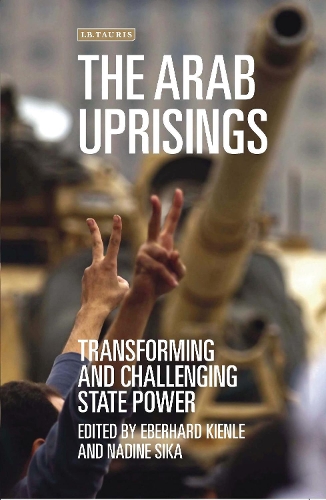
The Arab Uprisings: Transforming and Challenging State Power(Library of Modern Middle East Studies)
Series: Library of Modern Middle East Studies
The uprisings which spread across the Middle East and North Africa in late 2010 and 2011 irrevocably altered the way in which the region is now perceived. But in spite of the numerous similarities in these protests, from Tunisia and Egypt to Yemen and Bahrain, their broader political effects display important differences. This book analyses these popular uprisings, as well as other forms of protes
NaN
VOLUME
English
Hardback

The uprisings which spread across the Middle East and North Africa in late 2010 and 2011 irrevocably altered the way in which the region is now perceived. But in spite of the numerous similarities in these protests, from Tunisia and Egypt to Yemen and Bahrain, their broader political effects display important differences. This book analyses these popular uprisings, as well as other forms of protest, and the impact they had on each state. Why were Mubarak and Bin Ali ousted relatively peacefully in Egypt and Tunisia, while Qadafi in Libya and Saleh in Yemen fought violent battles against their opponents? Why do political transformations differ in countries that were able to shed their autocratic presidents? And why have other regimes, including Morocco and Saudi Arabia, experienced only limited protests or managed to repress and circumvent them? Looking at the aftermath and transitional processes across the region, this book is a vital retrospective examination of the uprisings and how they can be understood in the light of state formation and governmental dynamics.Table of Contents: Chapter 1: Introduction. Eberhard Kienle and Nadine Sika Chapter 2: Comparing Incomparables: The Spring of Peoples and the Fall of States – 1848 and 2011. Roger Heacock Chapter 3: Revisiting the Political Economy of the Arab Uprisings: Algeria and Yemen Compared. Fred H. Lawson Chapter 4: What Difference Does Contestation make? Agency and its Limits in the Arab Uprisings. John Chalcraft Chapter 5: The Gulf Monarchies: State-building, Legitimacy and Social Order. Thomas Demmelhuber Chapter 6: The Resilience of Arab Monarchies and the ‘Arab Spring’: A Comparative Approach. Alain Dieckhoff Chapter 7: Popular Contestation, Regime Transformation and State Formation. Eberhard Kienle Chapter 8: Arab States, Regime Change and Social Contestation Compared: The Cases of Egypt and Syria. Nadine Sika
Price Comparison [India]
In This Series
Bestseller Manga
Trending NEWS




















